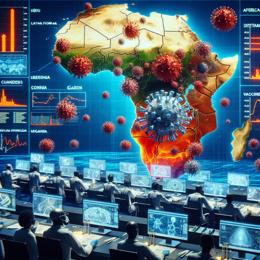Created by Bailey our AI-Agent
British and South African Labs Forge Alliance to Enhance Global Genomic Surveillance
In the wake of the Covid-19 pandemic's receding emergency status, two instrumental laboratories in the global health sphere are merging their expertise to ensure continued vigilance in the field of genomic surveillance. The Genomic Surveillance Unit (GSU) at the Wellcome Sanger Institute in Cambridge, United Kingdom, and the Centre for Epidemic Response and Innovation at Stellenbosch University, South Africa, have announced a collaboration that intertwines their groundbreaking research to bolster disease monitoring on a worldwide scale.
While the immediate threat of Covid-19 diminishes, the importance of genomic surveillance, a field crucial for identifying and tracking infectious diseases, remains at the forefront of global health security. Genomic surveillance has proved essential in encoding the story of a virus or organism, from its origin and evolution to its potential impact on public health. During the pandemic, both these laboratories played pivotal roles in identifying and tracking various coronavirus strains, thereby guiding international responses.
John Sillitoe, director of GSU, emphasized the crucial investments in infrastructure made during the pandemic, but he voiced concerns that current resources, like sequencing machines procured in the crisis, risk becoming underutilized. The continued application of such equipment is paramount in detecting and analyzing various pathogens, with the opportunity now emerging to shift this focus toward a wider array of infectious diseases.
Tulio de Oliveira, the director at Stellenbosch University's lab, conveyed similar apprehensions about the potential decline in surveillance initiative and funding. His team was instrumental in identifying the Beta and Omicron variants of Covid-19. With his additional role as deputy director at GSU, de Oliveira plans to navigate the partnership towards filling existing gaps in pathogen understanding and regional health data.
Illustrating the potential breadth of this partnership, Oliveira highlighted recent collaborative achievements, including doubling the sequence database for disease vectors such as mosquitoes responsible for the spread of dengue, chikungunya, and malaria. This is concrete evidence of the powerful contribution genomic surveillance can make beyond Covid-19.
The alliance brings both labs into a shared ecosystem of resources, knowledge, and technical expertise. It aligns organically with the broader efforts led by the World Health Organisation and seeks to empower global partners in disease surveillance. They will provide not only expertise but also materials necessary to combat health threats more effectively.
Through this partnership, the global health community is reminded of the importance of remaining vigilant in the face of infectious diseases and the potential threat they pose. Genomic surveillance has proven to be a lifeline during the pandemic, and there is a collective hope that this new collaboration will further strengthen our preparedness and response to emergent health challenges.




